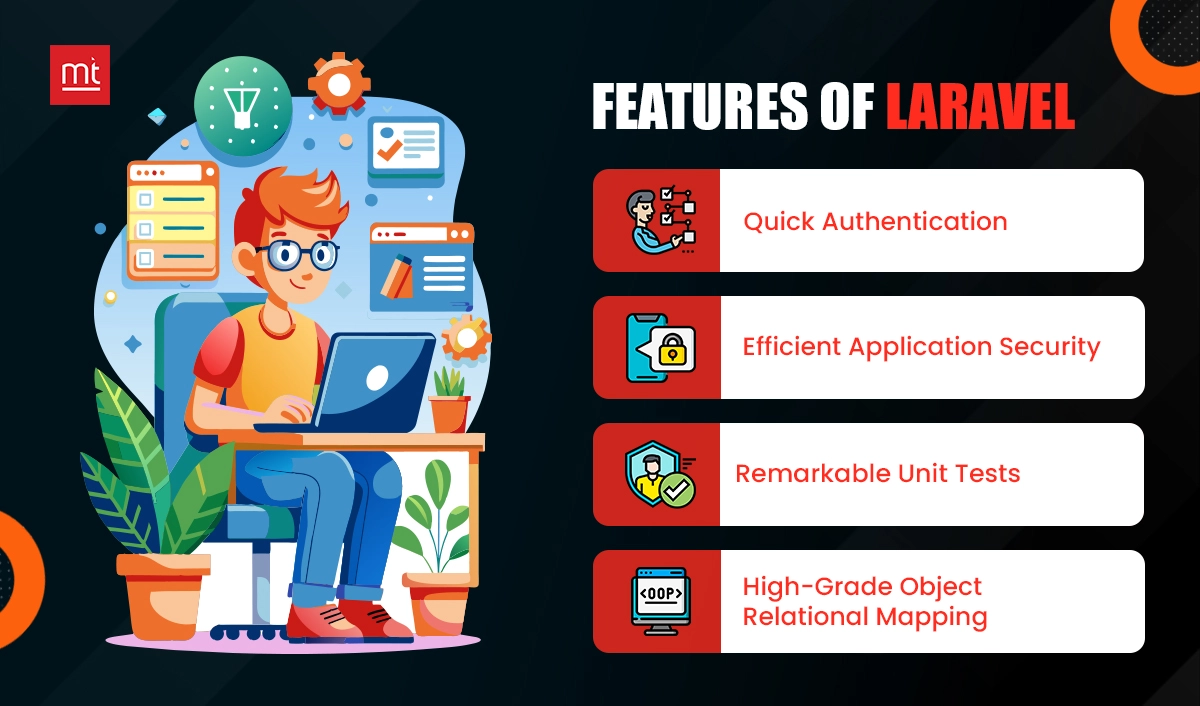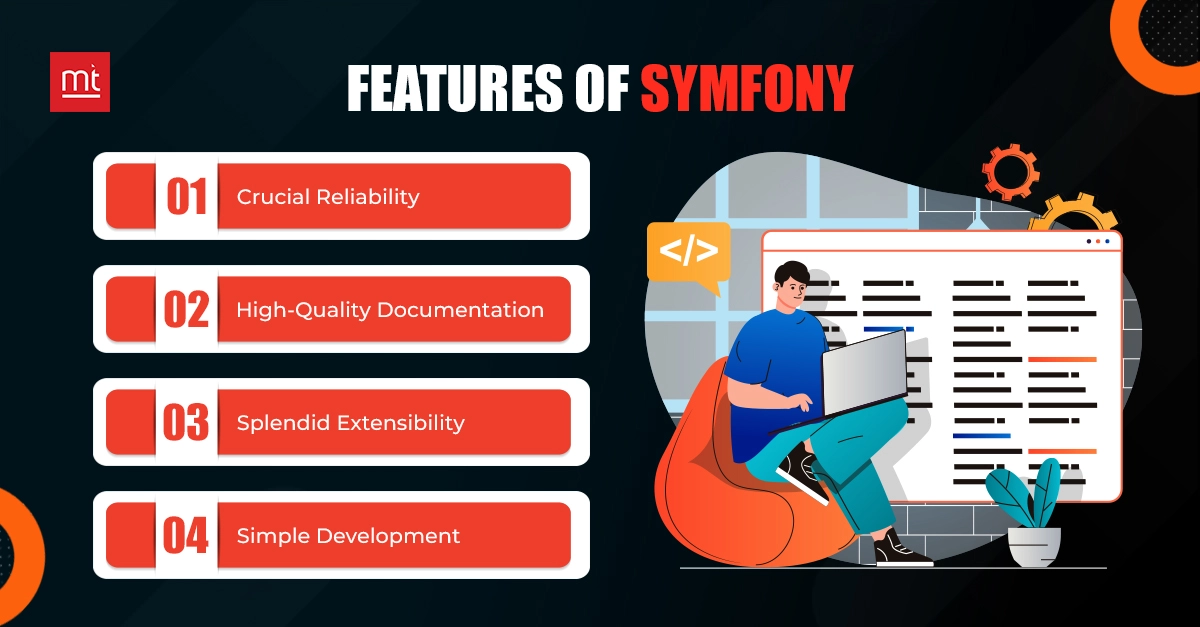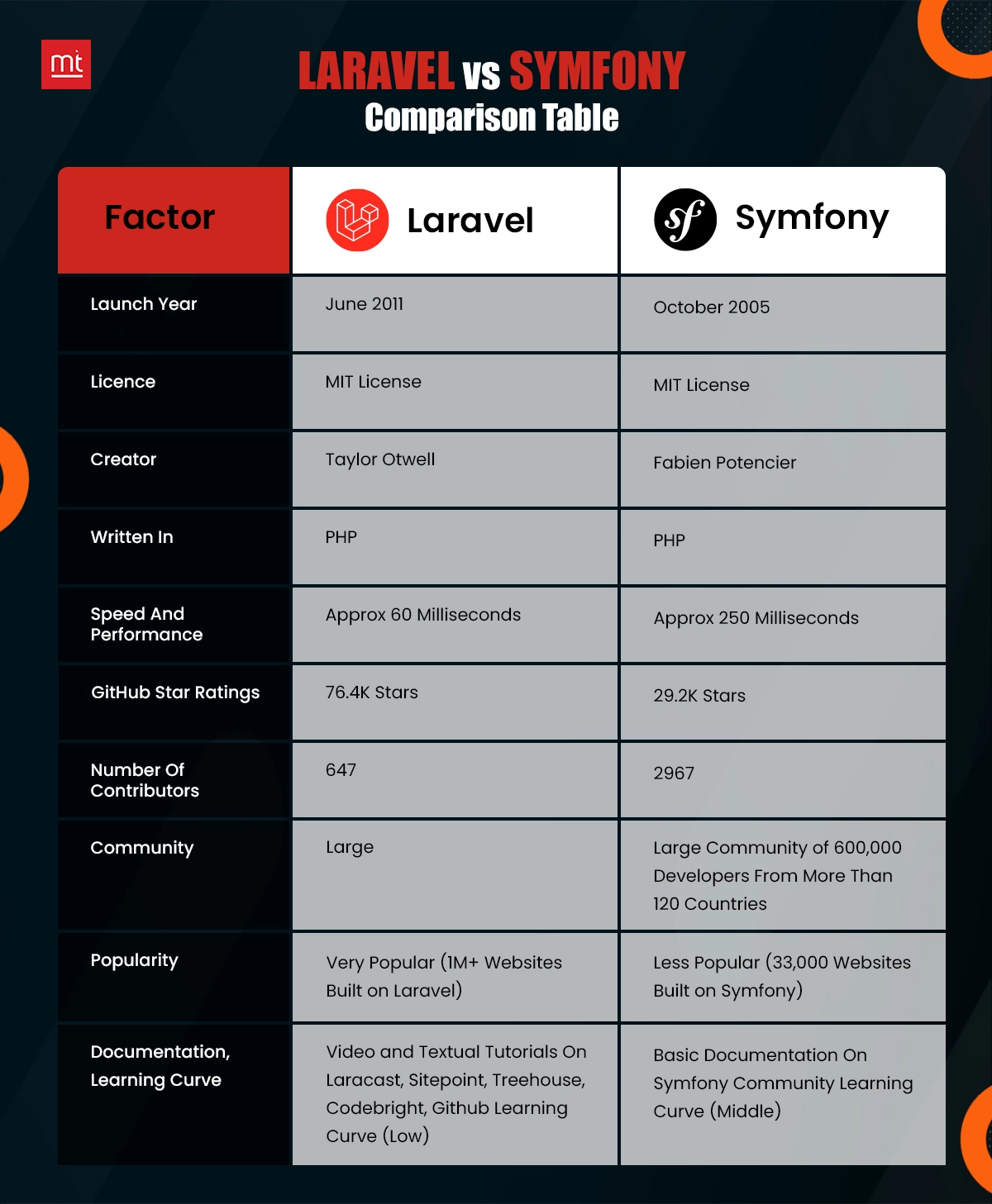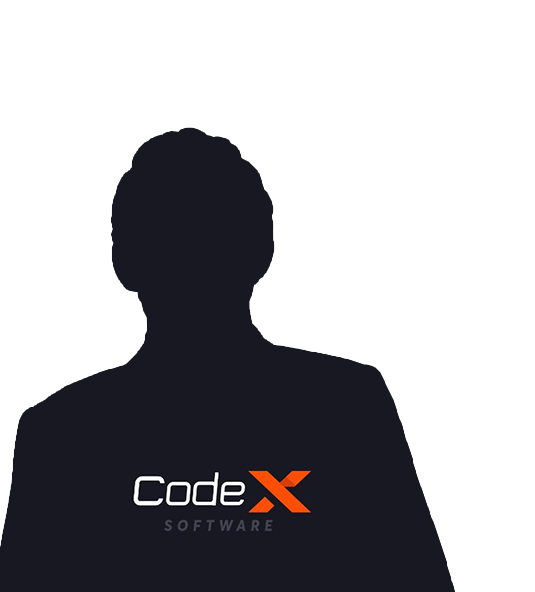Get Free Trial Week Developer Access, Try Before You Hire. Click Here to Claim Now
Introduction:
The choice of web development framework for your startup is a crucial one that could affect the course of the project. Among the many frameworks available, Laravel vs Symfony stands out as two of the most often used PHP choices. Rapid development finds Laravel perfect because of its simplicity, beauty, and vast ecosystem.
Conversely, Symfony is well-known for its scalability, adaptability, and strength, which fit complicated, large-scale uses. According to BuiltWith, 1,706,641 websites use Laravel, and 110,124 use Symfony, demonstrating their popularity, performance, and versatility.
Whether your development activities call for simplicity of use, performance, or comprehensive customizing, this comparison will help you to choose the most appropriate one.
Here, we will cover a thorough comparison of Symfony vs Laravel to help startups decide which framework fits their requirements more precisely.
What is Laravel?
The open-source PHP framework Laravel is highly regarded for its creative and beautiful syntax, which is compatible with the Model-View-Controller (MVC) architecture. A fast programming style with minimal setup requirements is what Laravel, the well-established and feature-rich web application framework, offers.
Laravel has been a game-changer for the framework's popularity and growth since its debut. Laravel, on the other hand, is designed to build web applications by reusing parts of other frameworks. Overall, it's a lightweight and automated method that lets you easily divide the business logic code and display code as you work. Despite being open source and free to use and share, Laravel makes $15–25 million a year.
Features of Laravel

1. Quick Authentication
Laravel offers a basic but strong authentication mechanism. Easily installed with little setup, it provides login, registration, password reset, and email validation.
2. Efficient Application Security
Built-in security measures available from Laravel include cross-site scripting (XSS), cross-site request forgery (CSRF), and SQL injection prevention. Its salted and hashed passwords guarantee integrity and data protection.
3. Remarkable Unit Tests
Laravel is meant for testing. It guarantees that your code is dependable and bug-free by including tools for unit testing and a handy approach to evaluating apps.
4. High-Grade Object Relational Mapping
Laravel's Eloquent ORM lets developers communicate with the database using an expressive syntax, simplifying database interactions. It facilitates simple data retrieval and manipulation and supports many database systems.
Advantages of Laravel
- Laravel makes use of modern, sophisticated PHP capabilities.
- It opens the door for you to use API integrations or third-party systems.
- Helps save time by being compatible with automated testing methodologies.
- Web app layouts may be created using the template engine.
- An effective structure for the quick development cycle.
- A syntax that is simple to learn and understand is available to Laravel users.
Disadvantages of Laravel
- Laravel is a scalable framework, and it has poor loading times for certain big projects.
- New versions of Laravel appear; however, they often become incompatible with one another.
- If you store too many database queries in Laravel, it could lead to data congestion on the backend.
- When developers don't have access to many third-party libraries, Laravel might be somewhat unpredictable.
What is Symfony?
A variety of PHP components are integrated into the Symfony framework, similar to Laravel. Indeed, despite being the top PHP framework, Laravel still makes use of around fourteen Symfony components. Symfony works as a whole to provide innovative web apps with useful features and ideas. Its primary goal upon creation in 2011 was to facilitate the rapid creation of web applications by doing away with tedious, repetitive code.
Its tracking systems and reusable PHP components make it ideal for streamlining complex projects. The Symfony framework is adaptable enough to provide solutions for a wide variety of project kinds.
Features of Symfony

1. Crucial Reliability
Reliability is integrated into Symfony. Many big applications and frameworks make use of its elements, so they are constantly tested and reliable.
2. High-Quality Documentation
Symfony offers thorough and orderly documentation, which facilitates learning and efficient use of the framework for developers.
3. Splendid Extensibility
Highly adaptable, symfony lets developers expand the framework to fit their own requirements and modify it. It has a flexible design that lets fresh ideas and capabilities be added.
4. Simple Development
By encouraging best practices and design patterns, Symfony helps developers produce scalable, manageable, clean, and easily readable code. Its reusable parts may be used in many applications, saving development time and effort.
Advantages of Symfony
- Symfony may be adjusted to suit the particular requirements of every project.
- Symfony is fit for large-scale projects as it is maximally performing.
- By using Symfony's parts for many projects, development efficiency is raised.
- Using industry standards and best practices, Symfony writes high-quality, maintainable code.
Disadvantages of Symfony
- Beginning users may find Symfony difficult, given its adaptability and rich capabilities.
- Symfony calls for more settings than some other frameworks, which might slow down the initial setup process.
- Symfony's wide range of features and capabilities might make it resource-intensive, hence possibly influencing performance on smaller applications.
Laravel vs Symfony Comparison Table

Difference Between Symfony vs Laravel
Here are some of the leading differences between Symphony vs Laravel to make an ideal choice for your businesses:
#1. Origin
Laravel was first created by Tailor Otwell in response to overcoming the limitations of Codeigniter, such as missing support for Continuous Integration. Although both Laravel and Symfony are MVC-based frameworks, Laravel is more committed to its MVC architecture than Symfony. Laravel is optimized to support rapid application development and deployment.
Symfony, on the other hand, is inspired by Java’s Spring Framework, which was created by SensioLabs. Symfony emerged as a highly modular framework that is frequently used for its set of reusable, cohesive, and decoupled components, which solve many web development problems.
#2. Performance
The runtime performance of both these frameworks can be easily tracked by measuring their page loading speed. It is believed that in older versions, Laravel development services outperformed Symfony, but after recent improvements in Symfony 4, Laravel deprived in performance when compared to Symfony.
However, if you are working on the latest version of both platforms, you will experience the same or slightly better page loading speed in Laravel. When measured, Laravel websites take around 60 ms to load while Symfony websites take around 250 ms. This difference is because Laravel caches only the views, while Symfony caches both the source code and view.
#3. Continuous Integration
Symfony offers flawless interaction with well-known CI solutions as Jenkins, Travis CI, and CircleCI, Symfony supports a CI/CD workflow that is seamless. Whereas use of Laravel Forge and Envoyer offers strong CI support, automating deployment and server administration becomes simpler.
#4. Templating Engines
Symfony makes significant customizing and flexible use of Twig, a fast and safe template engine. On the other hand Laravel using simpler and more intuitive Blade that lets you easily inherit templates and handle sections.
#5. Security
Offering built-in security tools like authentication, CSRF protection, and input validation, Symfony guarantees strong security for applications. Whereas Laravel is equally robust in security, Laravel boasts solutions like Laravel Sanctum for API token management, CSRF protection, and hashed passwords.
#6. Database Migration
Symfony makes use of Doctrine ORM, a strong and very adaptable tool with comprehensive database management and migratory capabilities. Whereas Laravel uses Eloquent ORM, which is renowned for simplicity and ease of use, Laravel easily connects with its migration system to handle databases.
#7. Cost
Though free and open-source, Symfony's complexity often results in extra development expenses as it usually calls for more seasoned engineers. Although Laravel is also free and open-source, its simplified setup and vast community help to lower development time and expenses, therefore making it more reasonably cost-effective.
#8. Documentation and Learning Curve
When we perceive both frameworks in terms of documentation and learning curve, Laravel wins the medal. Laravel offers detailed video tutorials and support called Laracasts that enable developers to start developing apps.
However, choosing Symfony web development services has a steeper learning curve than Laravel since Symfony offers obvious documentation for its bundles, components, libraries, and so on. Moreover, learning to program applications with Laravel is much easier than Symfony, which requires advanced technical expertise and more time.
#9. Support
Symfony is Supported by SensioLabs and a vibrant community, symfony provides professional assistance and many community-driven resources. Whereas Laravel is supported by a vibrant community with tools such as Laravel News and Laravel Podcast offering updates and insights, Laravel guarantees strong community support.
Conclusion
Strong PHP frameworks with separate benefits and drawbacks abound from Laravel and Symfony. Startups trying to get going rapidly will find Laravel a wonderful fit because of its simplicity, ease of use, and strong ecosystem. Larger and more complicated projects might be better suited for Symfony, which provides more adaptability, performance, and scalability.
At ManekTech, we have a dedicated team of developers with over decades of experience serving startups and established businesses in meeting their development requirements. Whether you choose Laravel or Symfony, we have an expert touch to make the most of every development technology.
Contact us today to hire developers who can maximize the benefit of development technology
Recent Blogs
Subscribe to Our Newsletter!
Join us to stay updated with our latest blog updates, marketing tips, service tips, trends, news and announcements!




















